- Home
- Ellen Datlow
The Dark Page 18
The Dark Read online
Page 18
Miranda cast another look in the direction of the exit, where the elderly man on the chair was nodding in agreement.
“Daisy,” the visiting speaker said with a sudden change of tone. “Who’s Daisy? Whoever you are, it’s not your real name, it’s your nickname, I know. I know you’re here somewhere, put your hand up, love.”
Nothing happened for a few moments but then, almost masked to Miranda by one of the church pillars, a tentative hand was raised.
“Someone used to call you Daisy, didn’t he?” Anderson said. “And it’s a name you’ve not heard for a long time. We’re talking about someone who’s passed over.”
Miranda couldn’t quite hear the response but it sounded like, “My brother.” She tried to lean out a little way to see more, but it didn’t help.
She knew how these things worked. He’d start fishing now, building on the woman’s responses, shaking plausible-sounding information out of the tiny cues she’d be giving him.
“Just a minute, love …” Anderson said, and then he turned and spoke to the empty air beside him. Spoke to it as if there was a person standing there.
And Miranda thought, Oh, come on.
She thought, They may be old and they may be credulous, but don’t treat them as if they’re stupid.
“What are you telling me?” Anderson was asking the air. “It wasn’t just Daisy, it was Daisy May?” He turned his attention back to the woman in the audience. “Is that right?”
“I had an Auntie May,” the woman said, her voice barely audible even though she’d raised it.
“That’s what he’s trying to tell you,” Anderson said with the triumph of a hard-won discovery. “That’s who he’s bringing the message from.”
The message was something about the fears surrounding a medical procedure. The drift of it was that all would be well in the end. He went on like this, working his way through the audience, picking people out and talking to the spirits that he insisted were at their shoulders, sometimes bantering or making a friendly argument out of his dialogue with the invisibles.
It was fascinating, in its way. Even though she found it ludicrous, Miranda didn’t move or try to escape. She didn’t want to do anything that might draw the speaker’s attention. She sat tight, like someone scared of making an erroneous bid at an auction.
When she caught a movement from the corner of her eye, she looked and saw that her father was studying the handheld device that he’d been using the previous night. It was about the size of a TV remote and showed its information on a liquid crystal screen. He was holding it low, so it would be concealed from the—what could she call them? Congregation? Audience?—by the empty bench in front.
It didn’t end until more than two hours later. Anderson had talked himself hoarse, but looked as if he was game to go on indefinitely. The man who’d introduced him moved a vote of thanks, and everyone applauded. Miranda joined in, enthused by the prospect of unpeeling her rear end from the woodwork. After the time she’d spent seated, it was as if she had nothing beneath her but thin flesh pinned to the bench by the pointed ends of her pelvic bones.
There was a bucket collection for the roof fund, and then there was an announcement of a small spread in the vestry, consisting of tea and packet cakes and buttered malt bread.
“I’m not staying,” Miranda warned her father.
“Neither am I,” he said. “Just give me one minute.”
She was assuming that her father wanted to talk to the speaker, but Hood ignored him and exchanged words with some of the others. They crowded around him, all but neglecting their guest. One woman had brought along a magazine that she produced and now pressed on him.
“I saved this for you, Doctor Hood,” Miranda heard her say.
“Did you, Mrs. Lord?” Hood said. “Thank you.”
“They’ve got a psychic’s page where people write in. One of the letters is just like the experience you told us about.”
“I shall read it. Thank you.”
And even though Miranda was trying her best to find it all too ridiculous for words, she couldn’t help feeling a twinge of envy at the genuine warmth that surrounded her father in this unlikely place.
He’d promised her a minute. They were out in just under twenty.
They walked some of the way home in silence. But then Miranda couldn’t help herself.
“Please don’t tell me you were taken in by any of that,” she said.
“Not the slightest danger,” he told her. “Don’t worry.”
“He was a total fraud.”
“Ah,” Hood said. “You can be wrong without being a fraud. Just as you can be sincere without being right.”
“What were you measuring?”
He showed her the instrument. “It’s called a tri-field natural EM meter. They were developed to measure the activity in electromagnetic storms. Ghosthunters use them.”
“And what did you pick up tonight?”
“Nothing at all.”
The main road was ahead. There were no cars to be seen, but the traffic lights changed and then changed back.
As they crossed, Miranda said, “They treated you like one of the family.”
“I’m their pet skeptic,” her father said. “They appreciate me. I give them open-minded attention without prejudice.”
As they made the turn through the gateway that led into the private lane, she said, “I don’t know where I stand with you. One minute I’m convinced you’re off your trolley. Then I can see a kind of sense in what you’re doing. Then suddenly I’m in the middle of a freak show and I don’t know what to think.”
“Don’t think, then,” he told her. “Just observe. I’m not going insane, however it looks. You could say that I’m just finding ways of preserving my sanity in the face of pressure. You should leave me to it.”
“Don’t think I wouldn’t, if I could.”
“Miranda, my problems are not your problems. I’m bright enough and old enough and ugly enough to sort them out for myself.”
“Well,” she said, “two out of three isn’t bad.”
When they got near to the house, she paused in the lane to check on her car. She couldn’t remember locking it earlier, but it turned out that she had. Looking up from the vehicle, she saw that her father had gone ahead and was at the top of the house steps with his key already in the door. He seemed to hesitate, and then he pushed the door open and went inside.
It had only been a moment, but in that hesitation she believed that she could read him exactly. It wasn’t as if he’d paused in apprehension of what he might find.
It was more as if he was bracing himself for the disappointment of finding nothing.
THE NEXT MORNING, Miranda slept late, but was still up and about before her father. She’d spoken to Dan for half an hour the night before and given him a list of people to call. She could get away with a week’s absence, she reckoned. In one week, she’d lose only money. More than a week, and she might begin to lose students. Two canceled lessons in a row might not bother her less committed pupils, but with the more competitive ones, it would start to count against her.
She filled a dish with boiling water to steam her vocal cords, and made a pot of tea with the rest. Then she poured herself a mug without milk and took it into the dining room, ready to run her voice exercises.
She’d always found this room a little bit intimidating. It had a clubby, Edwardian billiards-hall look, dark and high-ceilinged, done out in maroons and greens with dado rails and paneling. A low chandelier hung over the dining table. A hundred or more family pictures hung on the walls.
And there was the piano, of course.
Her mother’s upright Bechstein. Her father had offered to let her take it, but where would it go? The most that her own tiny lounge could run to was a Yamaha keyboard stowed off its legs in the space behind the sofa. And besides … moving in with Dan had been one of those try-it-and-see decisions, not the whole starry-eyed hog. She suspected that moving in and
bringing a piano would have been rather more than their tentative relationship could take.
She raised the lid to play herself a starting note, and was appalled at the thickness of the dust that had been allowed to gather on it. There was more on the lid than on anywhere else, and her fingers left marks where she touched it. The sooner he found a replacement for Mrs. Llewellyn, the better.
Then she frowned. She rubbed her fingers together and felt the texture of the powder that clung to them. Silky. Then she sniffed. Lavender.
Lavender?
It wasn’t dust at all. It was talcum powder.
He’d dusted the piano lid with her mother’s talc.
For what? Ghost prints?
She felt helpless.
Fortunately, he hadn’t dusted the keys as well, possibly out of a scientist’s respect for their underlying machinery. She struck a C and began her scales.
Few people had any idea of the sheer physical technique involved in producing vocal sound. After all, they probably reckoned, who taught the birds to sing? She heard plenty who believed that you just stood there and did it, and who stood there and did it down their noses, in whiny fake accents, off-key, off-note, off the beat, and with their voices full of breath and strain.
Miranda’s mother had taught her in this very room. She’d coaxed her through the grades and driven her to the festivals. Miranda could remember running up to her father’s study to show him her prizes: second, third in the class, the occasional first … and always the same reaction. He’d look over his reading glasses and say something along the lines of, That’s very good, Miranda. You’ll have to sing something for me later.
Always later. And somehow he was always occupied elsewhere when she sang.
Miranda sensed that she was not alone.
She became aware of him standing there in the doorway. She didn’t have to turn. She saw his reflection move in the glass of the photo frames, broken up and repeated like an image in an insect’s eye.
“This is where it happened to me,” he said.
She looked at him. He’d drawn a mug of tea from the pot and was there with it in his hand.
“How?” she said.
“The piano lid was open. I tried to pick out a scale. You know how much musical ability I’ve got. For once, it just came. And I had an overwhelming certainty that I wasn’t alone.”
“But you didn’t actually see her.”
“I saw nothing. I’m talking about awareness. Something I realized I had no definition for. Utter conviction without sensory evidence. I took my own pulse, and it was racing for no reason.”
Mug in hand, he moved around the room. This side of the house got the worst of the morning light, and was often gloomy. As now.
He said, “I looked for some kind of explanation. Because something here required one. It’s said that sometimes you can get a sense of presence or foreboding caused by a low-frequency standing wave from a fan or a vibrating object. But I tested the entire room and found nothing. Or stimulation of a certain part of the brain can induce a sense of formless apprehension, like there’s someone standing uncomfortably close to you.” He stopped by the enormous fireplace. There was a firescreen in the empty grate, and a basket of dried, dead flowers before it.
He said, “I had an encephalogram check over at the psych department and there’s nothing to that, either. All I know … is that for a moment, I knew she was here. It happened again a week later, in one of the rooms upstairs. I don’t know what triggered it that time. Something did, I’m sure. Something must.”
He was behind her now. He leaned past her to reach the dusty piano and started to pick out a scale with one finger.
Five notes into it, he went wrong.
The bad note jarred, and a mood was broken.
“Don’t hang around here,” he said. “Time’s not for wasting. Get on with your life.”
She hoped he wouldn’t look at her. But of course, he did.
He seemed bewildered. “What did I say?”
But all she could do by way of an answer was to turn away from him and run from the room.
LATER THAT MORNING, she met up with Peter Lee in the university library. He’d told her that with his own work on hold, he was making a little extra money researching old science journals for one of the other professors.
The library was an eighties addition, and such a monolith of a building that it looked as if it ought to have Stalin’s picture hanging down the side of it. From there, they walked across the campus to the visitor parking where Miranda had left her car. She’d asked Peter Lee to go to the house with her to see how much of the borrowed equipment could be spirited back to its rightful place. She was hoping that her father would be out when they got there. But he wasn’t.
They could hear voices coming from the kitchen. When Miranda went through, she found her father sitting at the kitchen table with a woman that she didn’t immediately recognize. Both looked up at her. Peter Lee hung back in the hallway, but Hood spotted him and called him in and then made the introductions.
The woman’s name was Yvonne. Yvonne Lord. She was the woman who’d saved a magazine to give to Miranda’s father the previous evening.
“Yvonne’s been describing her experience for me,” Hood explained. “It makes quite a story.”
“I’m sure it does,” Miranda said.
“Tell it again,” he suggested, and at that point he cast a look in Miranda’s direction. “We’re all open-minded, here,” he said. “Aren’t we?”
“Well, I don’t know what you’ll make of it,” Yvonne Lord said. “I’m afraid it might sound stupid.” She was a broad-shouldered, blonde-rinsed, quite handsome-looking woman of around fifty or fifty-five.
Peter Lee was pulling out a chair and sitting down, so Miranda reluctantly did likewise as the visitor began.
“It’s happened to me five times in the past three weeks,” she said. “Always when I’m just drifting off to sleep.”
Yvonne Lord was a widow. Her husband, much older than she, had been dead for almost three years. Even though she was a believer, she’d had no paranormal experience during most of that time. It was only when she’d had the bedroom redecorated that the apparitions had started.
“I see him in the room with me, over by the wall,” she said. It didn’t matter whether the light was on or not, she could see him whatever. He seemed to be calling to her but making no sound, reaching for her but making no progress. It was as if he was pulling against something, like a man harnessed to a big sled with weights that he could barely move.
The first couple of times it had happened, she’d been unable to react or speak. The third time, she said his name and believed that he responded by renewing his efforts. It was then that she became aware of other presences. These were much vaguer, and without faces, and they came right out of the wall. These, she realized, were the forces that were holding him back. As she watched, their strength overcame his and they pulled him away. Though he fought them every inch, he eventually vanished, silently screaming, into the new Sanderson vinyl that she’d picked out to match the carpet.
She was doing fine until the screaming part. Then her voice betrayed an unsteadiness that gave Miranda a moment’s feeling of guilt.
After that, she fell silent. Doctor Hood, who’d been taking notes, laid down his pen and said, “Is that everything?”
Yvonne Lord nodded.
“Right,” Hood said. “Thank you. I think we can dismiss the idea of a poltergeist outbreak, because it has none of the features. And it’s not a crisis apparition, because they only happen once, at a time closely related to the moment of death. Which leaves us with a residual or an intelligent haunting.”
Peter Lee said, “What’s the difference?”
“A residual haunting is just imprinted, usually on a location. Something triggers it and it plays back without variations. There’s no life or actual presence involved. An intelligent haunting is more interesting because it implies the existence of lif
e after death. The apparition can vary its behavior and interact with the observer. On what I’ve heard so far, this could make a claim to fall into either category. Everything depends on whether the apparition was merely following a pattern, or whether it really did alter its actions when you called your husband’s name.”
Peter Lee looked at the woman. “What do you think, Mrs. Lord?” he said. “Can you say for sure that there was a response involved?”
Yvonne Lord spoke carefully. “I think there’s some part of my husband that’s still with us,” she said. “I think he’s aware and in distress. The very thought of that is very hard for me to bear. I’ll do whatever it takes to get him out of it.”
“Dad …” Miranda said then. “There’s something I need to ask you. Can we … ?”
She left the question hanging, and Hood got to his feet. Leaving the graduate student and Yvonne Lord together, they moved through into the dining room.
Hood got in first, saying, “Where did you meet Peter Lee?”
“He’s helping me to sort out the mess you’ve got into. I bring him home, and what do I find? Tales from the Frigging Crypt in our own frigging kitchen! How embarrassing is that?”
She couldn’t help her voice escalating in intensity, but she did manage to keep its volume down. The effect was that she could barely prevent it from turning into an indignant squeak.
“Separate this out,” Hood said, dropping his voice and almost matching her tone. “There’s what she saw, and what she thought she saw. The distinction between the two is exactly the area I’m interested in.”
“Yeah, well give some thought to what she might be interested in.”
“Oh, for God’s sake, Miranda!”
“You were quick enough to spot the glad eye from Mrs. Llewellyn when there was no hocus-pocus involved!”
“Do you really not know someone’s genuine pain when you see it?”
She wanted to say that the reality of the pain didn’t prove the authenticity of its supposed cause, that maybe the mind just cut and shaped its own expression where the distress had no ready form … until she realized that she was getting perilously close to quoting the dubious wisdom of Doctor Arthur Anderson, at which point she broke off the argument and went to haul Peter Lee out of the kitchen. He and Yvonne Lord were making polite conversation, but he got to his feet and came at her command.

 Inferno
Inferno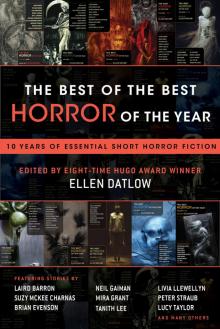 The Best of the Best Horror of the Year
The Best of the Best Horror of the Year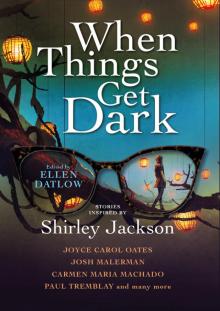 When Things Get Dark
When Things Get Dark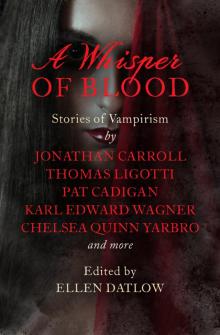 A Whisper of Blood
A Whisper of Blood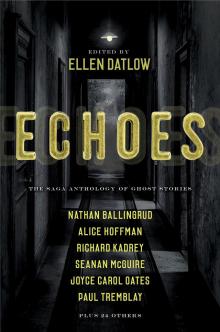 Echoes
Echoes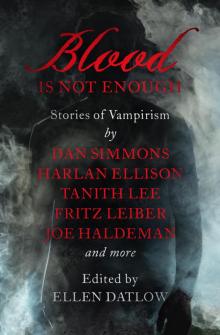 Blood Is Not Enough
Blood Is Not Enough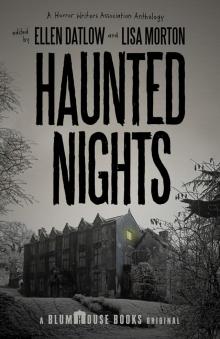 Haunted Nights
Haunted Nights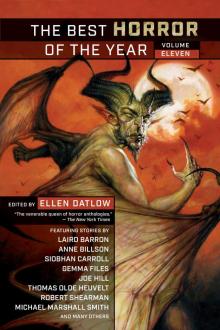 The Best Horror of the Year Volume Eleven
The Best Horror of the Year Volume Eleven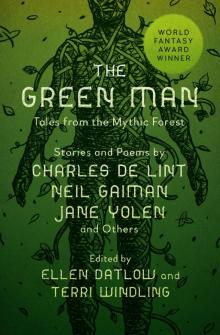 The Green Man
The Green Man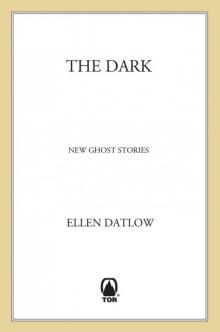 The Dark
The Dark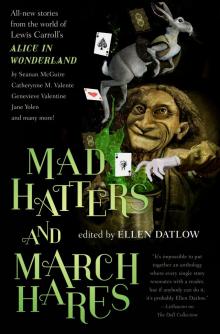 Mad Hatters and March Hares
Mad Hatters and March Hares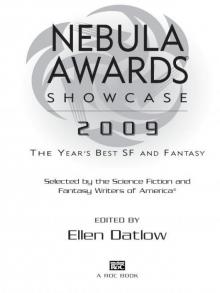 Nebula Awards Showcase 2009
Nebula Awards Showcase 2009 The Devil and the Deep
The Devil and the Deep